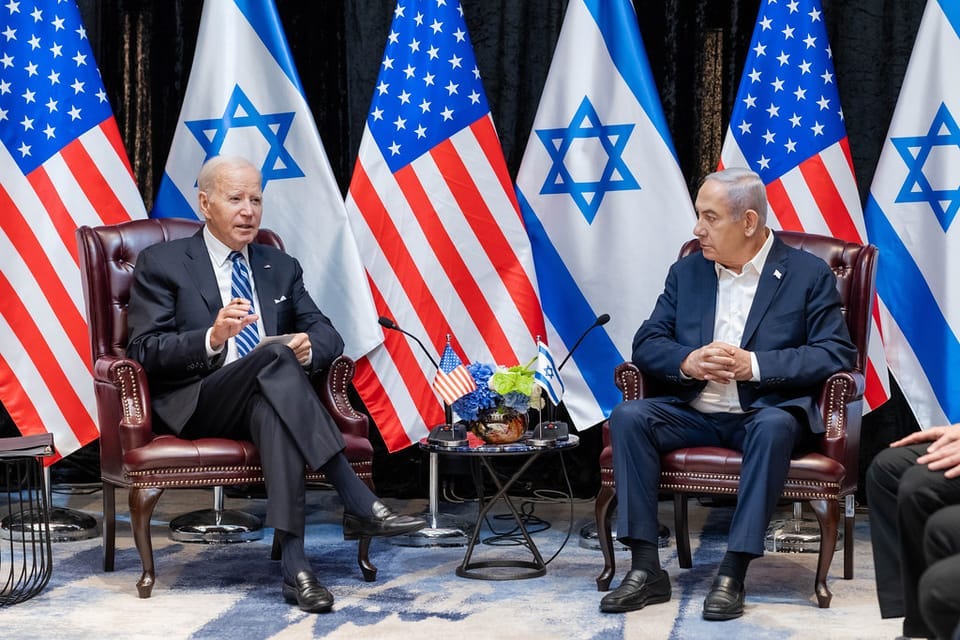Biden flips the script on Bibi
Benjamin Netanyahu has spent decades boxing in American presidents. Last week, Joe Biden turned the tables.

Good morning! It’s Monday, June 3, 2024. Election Day is 155 days away. If this newsletter was forwarded to you, subscribe here. If you want to contribute to support my work, donate here.
The Republican Party’s presidential nominee has been criminally convicted, so naturally the Democratic Party is the one divided about its response.
While the GOP has almost universally rallied behind Trump — he’s not just a candidate, House Speaker Mike Johnson said this weekend, “now he’s seen as a symbol” — Democrats are squabbling amongst themselves about whether to address the conviction head-on or to focus their campaign on other matters. (Will Rogers’ immortal quip, “I’m not a member of any organized political party. I’m a Democrat,” comes to mind.)
Personally, I think President Biden’s speech on Friday actually offered the strategically correct answer to this question: Why not both? Biden began his remarks by addressing the news in simple terms, fact-checking a few key claims (“Donald Trump was given every opportunity to defend himself”) and stridently defending the American justice system (“It’s irresponsible for anyone to say this was rigged just because they don’t like the verdict”), but refrained from going overboard in attacking Trump himself.
Then, he showed that he was returning to the business of governing, by focusing the rest of his remarks on the war in the Middle East. To my mind, this is the politically wise way for Biden to treat Trump’s legal problems: polls show it is a vulnerability for Trump, so it would be crazy for the president not to mention it — but polls also show that voters care more about other issues and that they are tired of all the chaos and drama, so it is smart not to descend into the muck and make it the only talking point of your campaign.
The address also provided a sharp contrast with Trump’s own speech after the conviction was announced: while the theme of Trump’s remarks was his own personal grievances, Biden’s focus in his speech was expressing his sympathies to other people who were hurting, specifically Israeli and Palestinian victims of the war and their families.
With the dramatic backdrop of Trump’s 34 convictions, it would be easy for an analysis of Biden’s speech to end there, noting only how the president handled the historic verdict. Indeed, the first two minutes of the 15-minute remarks dominated news coverage after Biden left the lectern.
However, what Biden had to say about the Middle East was notable in its own right — which is why I’d like to spend some time unpacking it for you here.
Israeli prime minister Benjamin Netanyahu has spent decades trying to strong-arm American presidents, from lecturing Bill Clinton to going around Barack Obama to address Congress about the Iran nuclear deal. When Biden was vice president, Netanyahu’s government announced new settlements in East Jerusalem right as Biden touched down for a visit to Israel, a move “widely seen as a slap in the face” to the U.S., as NBC News reported at the time.
Even though Israel wields a tiny fraction of America’s size and influence, Netanyahu chafes at any suggestion that his country is the junior partner in the U.S.-Israel relationship, and rarely misses an opportunity to show it. “Who the f—k does he think he is?” Bill Clinton reportedly griped to staffers after his first meeting with Netanyahu. “Who’s the f—king superpower here?”
That pattern has largely repeated itself throughout the current Israel-Hamas war, with Netanyahu publicly rebuffing Biden’s “day after” plan for Gaza and his “red line” on Rafah.
Biden’s speech on Friday was a rare instance of the president turning the tables on the prime minister: Biden moving to box Bibi in, instead of the other way around.
During the address, Biden unveiled what he described as a three-phase “Israeli proposal” to end the war in Gaza:
Phase 1: A “full and complete” ceasefire for six weeks, in which Israel would withdraw from “all populated areas of Gaza” in exchange for the release of the Israeli hostages. Meanwhile, Palestinian civilians “would return to their homes and neighborhoods in all areas of Gaza” while “humanitarian assistance would surge with 600 trucks carrying aid into Gaza every single day.”
Phase 2: The temporary ceasefire would elevate to the “cessation of hostilities permanently” in exchange for the release of all the remaining living hostages.
Phase 3: Any final remains of deceased hostages would be returned as “a major reconstruction plan for Gaza would commence.”
The proposal, Israel’s most expansive yet, was reportedly unanimously approved by the country’s war cabinet, including Netanyahu, last Wednesday — but, as of Friday, its contents had yet to be made public. It was Biden, not Netanyahu, who eventually unveiled the offering, putting pressure on Hamas to accept the proposal and on Netanyahu not to back away from it now that it was in the public eye.
“Israel has offered a comprehensive new proposal...Today, I want to lay out its terms for the American citizens and for the world,” Biden said, broadcasting the proposal’s details before it could fall apart behind closed doors. In effect, he was putting Netanyahu in a corner — just as Netanyahu has repeatedly done to him.
Instead of Netanyahu stoking America’s political divisions, Biden’s speech had the effect of upping the domestic pressure on Netanyahu. Shortly after the president’s address, two far-right members of Netanyahu’s government — finance minister Bezalel Smotrich and national security minister Itamar Ben-Gvir, neither of whom are in the war cabinet — threatened to leave his coalition if the proposed agreement goes forward. On the other side of the Israeli spectrum, opposition leader Yair Lapid said he would offer a “political safety net” for Netanyahu, promising to support the deal if Smotrich and Ben-Gvir bolt from the coalition. Wedged in the middle, Netanyahu now has to make a decision between these two factions.
Meanwhile, an estimated 120,000 people rallied in Tel Aviv, calling on Netanyahu to stand by the agreement. This popular protest sign, posted on X by Middle East reporter Noga Tarnopolsky, shows the extent to which Biden boxed in Netanyahu. “The people demand Netanyahu’s plan,” it reads, calling on the prime minister to push for what Biden had revealed was his government’s own proposal.
So far, Biden’s gambit has been met with some success — but plenty of landmines remain. The thrust of his speech was a call for Hamas to take the deal: “Hamas says it wants a ceasefire. This deal is an opportunity to prove whether they really mean it,” he said. Biden then followed up the address with a rare joint statement with Egypt and Qatar, who are mediating the ceasefire talks, calling on “both Hamas and Israel to finalize the agreement.”
And although it appears Hamas rejected the Israeli proposal before it was made public, once Biden revealed that Israel had accepted some of its key demands — including allowing for some of the hostages releases in phase one to be remains, rather than living captives — the group said that it “looks positively” on the proposal. According to Lebanese media, Hamas has said they will provide a formal response once the Biden administration provides guarantees that Israel will fully comply with the proposal.
Meanwhile, Netanyahu’s initial response to Biden’s speech was interpreted as a snub — but, notably, he did not reject or embrace the proposal. Netanyahu’s chief foreign policy adviser later confirmed that the proposal was “a deal we agreed to — it’s not a good deal, but we dearly want the hostages released, all of them.”
It appears that some details still need to be confirmed: Biden’s assertion that the proposal included an Israeli promise to continue the temporary ceasefire past phase one, as long as hostage negotiations were continuing, has been shot down by Israel. The core questions that have loomed over these negotiations since the beginning — about whether Israel will permanently withdraw from Gaza and about who will govern the territory after the war — also remain unanswered.
As with each previous round of talks, both Netanyahu and Hamas leader Yahya Sinwar must now decide whether to side with the extremists in their fold, who want the war to continue, or the moderates, who are calling for a ceasefire. Friday’s speech marked Biden’s boldest attempt yet to guide both sides to the middle, and to the negotiating table. “It’s time for this war to end,” he said, “and for the day after to begin.” It remains to be seen whether either of the war’s combatants agree.
More news to know.
AP: Mexico elects Claudia Sheinbaum as its first female president
Axios: Trump joins TikTok, outpaces Biden campaign for followers in hours
WaPo: Trump falsely claims he never called for Hillary Clinton to be locked up
New Jersey Globe: Menendez will file independent re-election bid
The Atlantic: The Dalai Lama Is Landing in the Middle of the 2024 Election
The day ahead.
— President Biden will start the day at his home in Wilmington, Delaware. Later tonight, he will participate in a campaign fundraiser in Greenwich, Connecticut, before returning to the White House.
— Vice President Harris is in Los Angeles, California. According to the White House, she will “participate in an interview for Pride Month,” although the outlet was not disclosed.
— The Senate will hold a procedural vote on Christopher Hanson’s nomination to be a member of the Nuclear Regulatory Commission.
— The House is scheduled to vote on a resolution “calling on elected officials and civil society leaders to join in efforts to educate the public on the contributions of the Jewish-American community.”
— The trial of Hunter Biden will begin today in Wilmington, Delaware, with jury selection. Biden, who is the first child of a U.S. president to go on trial, faces three felony charges alleging that he lied on a gun purchase form, falsely stating that he was not using drugs at the time of the purchase. (The younger Biden also faces nine tax-related charges, on which he will stand trial in September in California.)
“I am the President, but I am also a Dad. Jill and I love our son, and we are so proud of the man he is today,” President Biden said in a statement this morning about Hunter’s trial, which opens just days after his political opponent was criminally convicted at a trial of his own. First Lady Jill Biden is at the Delaware courthouse attending the trial’s opening.
— Dr. Anthony Fauci will testify before the House Select Subcommittee on the Coronavirus Pandemic today. Ahead of his appearance comes, Republicans on the panel released a transcribed interview with Fauci in which he acknowledged that the directive to keep six feet apart during the pandemic was “an empiric decision that wasn’t based on data.”
Thanks for reading.
I get up each morning to write Wake Up To Politics because I’m committed to offering an independent and reliable news source that helps you navigate our political system and understand what’s going on in government.
The newsletter is completely free and ad-free — but if you appreciate the work that goes into it, here’s how you can help:
Donate to support my work or set up a recurring donation (akin to a regular subscription to another news outlet).
Buy some WUTP merchandise to show off your support (and score a cool mug or hoodie in the process!)
Tell your family, friends, and colleagues to sign up at wakeuptopolitics.com. Every forward helps!
If you have any questions or feedback, feel free to email me: my inbox is always open.
Thanks so much for waking up to politics! Have a great day.
— Gabe



